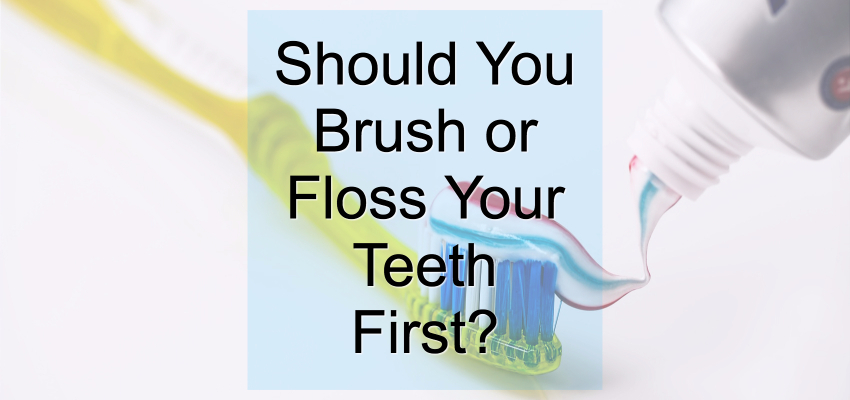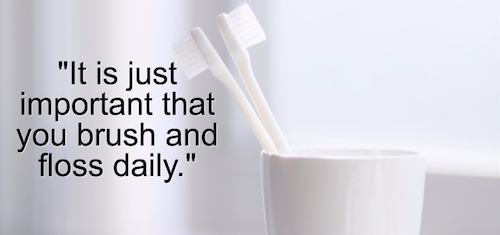Like the age-old question about the chicken and the egg, many people ask which should come first: brushing or flossing?
This question of whether we should brush or floss first has been hotly debated in households ever since the advent of modern dentistry. The irony of this conundrum is that there is no real answer. It is just important that you brush and floss daily.
The Debate
There are two sides to this argument. The first is that brushing takes away most of the plaque and flossing does the extra cleanup in hard to reach places. The second argument is for flossing your teeth first. It suggests that flossing first eliminates the plaque between teeth. This allows your toothpaste and toothbrush bristles to efficiently clean the remaining area.
One precaution that you should take is to not make flossing an afterthought regardless of which order you choose. Because flossing must be done only once a day, it may be easier to consider it less important than brushing.
However, only with the combination of brushing and flossing will you get the complete removal of plaque and bacteria from all areas of your teeth.
How often should I brush or floss my teeth?
According to the Canadian Dental Association, you should brush your teeth at least twice a day and floss your teeth at least once a day. Replacing your toothbrush every three months or whenever the bristles fall out or look worn is also a best practice. You should also use non-alcoholic mouthwash at least once a day or after every time you brush.
Using a mouthwash will eliminate more bacteria that remains on your gums and in your mouth. In addition, you should brush your tongue. This will get rid of harmful bacteria that sits in the back your throat, causing bad breath and halitosis.
What are the additional benefits of brushing and flossing?
Not only does brushing and flossing regularly keep your teeth looking great, it also improves your overall health. Good oral hygiene has already been linked to the reduced risk of heart disease and other chronic conditions, and now recent studies are discovering even more benefits.
On April 1st, 2016 in the American Geriatrics Society Journal, missing or damaged teeth were often linked to higher rates of dementia.
If healthy teeth become equivalent to having a healthy brain what more reasons do you need to keep up with brushing and flossing religiously?
What toothbrushes are the best?
The Canadian Dental Association recommends soft bristled brushes. If you use an electric toothbrush, use the lowest setting with soft bristles.
Electric toothbrushes are able to remove up to 6 times the plaque compared to ordinary toothbrushes. They can give you that squeaky-clean feeling one typically only experiences after a professional cleaning.
However, do not use the higher powered settings too often because they will be too abrasive to your enamel.
Also, be aware of how often you use whitening toothpaste with either kind of toothbrush. Whitening toothpaste is abrasive in itself, leading to enamel damage and tooth sensitivity.
Regarding floss, waxed floss glides more easily between your teeth than unwaxed floss, but it doesn’t matter which kind of use as long as you do floss once a day.
What are some best practices for at-home care?
Your technique is extremely important with flossing. Make sure you floss not only between your teeth but underneath and around the tooth to eliminate all the hard-to-reach plaque that would otherwise become tartar, which is difficult to remove.
When brushing your teeth, you need to clean every area possible: the fronts of your teeth and behind them. The area behind your top molars is often ignored so be sure to get every spot in order to prevent cavities.
Brushing your tongue will also help slow down bacterial growth between your brushings.
Make sure to brush and floss regularly!
Overall, it does not matter if you brush or floss first. What really matters is that you brush your teeth at least twice a day and floss your teeth at least once a day. It is also important to use the correct techniques when brushing and flossing to maximize the effects on preventing gum disease and cavities.
Integrating other best practices like brushing your tongue and using mouthwash once a day can also further improve your oral health. This will lead you to a better overall health and a reduced risk of problems as you age.
If you have any questions about brushing or flossing or anything else related to your oral health contact us today.


